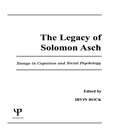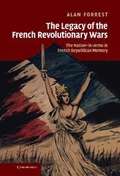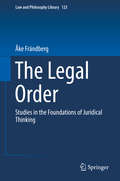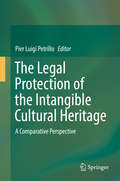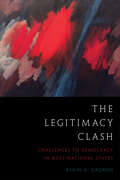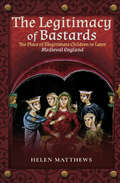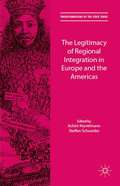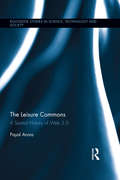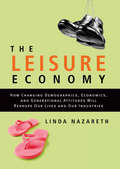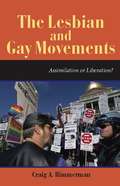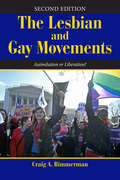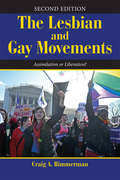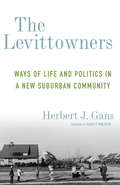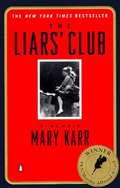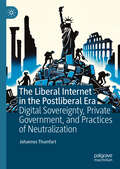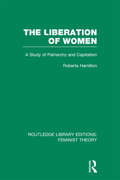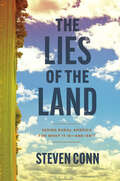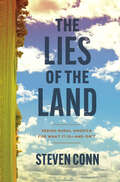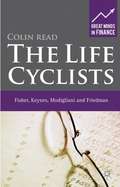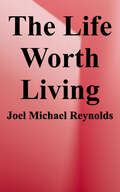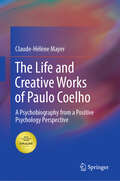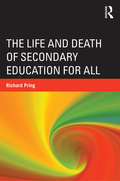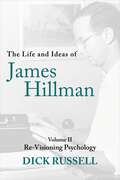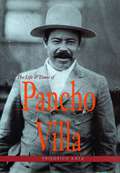- Table View
- List View
The Legacy of Solomon Asch: Essays in Cognition and Social Psychology
by Irvin RockThis volume honors Solomon Asch, a pioneer in social psychology whose experiments in this field are considered classic. Asch has made important contributions to the fields of memory, learning and thinking, and perception along with extending Gestalt theories to social psychology research. Former students and colleagues honor Asch with essays that either expand on his research or describe original research on new topics of related interest. An interesting and informative text for faculty and researchers in the fields of cognition and perception as well as social, experimental, and personality psychology.
The Legacy of the French Revolutionary Wars: The Nation-in-Arms in French Republican Memory
by Alan ForrestA major contribution to the study of collective identity and memory in France, this book examines a French republican myth: the belief that the nation can be adequately defended only by its own citizens, in the manner of the French revolutionaries of 1793. Alan Forrest examines the image of the citizen army reflected in political speeches, school textbooks, art and literature across the nineteenth century. He reveals that the image appealed to notions of equality and social justice, and with time it expanded to incorporate Napoleon's victorious legions, the partisans who repelled the German invader in 1814 and the people of Paris who rose in arms to defend the Republic in 1870. More recently it has risked being marginalized by military technology and by the realities of colonial warfare, but its influence can still be seen in the propaganda of the Great War and of the French Resistance under Vichy.
The Legal Order: Studies in the Foundations of Juridical Thinking (Law and Philosophy Library #123)
by Åke FrändbergIn this monograph a fundamental distinction is made between law and juridical thinking. Law is the content of legal rules and the systems of legal rules. Juridical thinking is the handling of the law by the lawyers. To this distinction corresponds a basic distinction between the language of law and the language of juridical thinking, and correlatively, between L-concepts (law concepts) and J-concepts (juridical or jurisprudential concepts). The monograph is devoted to the J-concepts, especially of technical (not ideological or evaluative) J-concepts. Four kinds of J-concepts are investigated: morphological J-concepts, those that help us to structure the law in a logical and functional way; topological J-concepts, those that help us to indicate the phenomena to which the law is applicable, and to separate the areas of application for different legal systems; praxeological J-concepts, those that help us to explore the relations between law and action, and methodological J-concepts, those that help us to describe the methods of the professional-juridical handling of the law. The work can be characterised as presenting a lawyer´s philosophy of law.
The Legal Protection of the Intangible Cultural Heritage: A Comparative Perspective
by Pier Luigi PetrilloThis book describes the global legal framework for safeguarding the “Intangible Cultural Heritage” – as defined by the UNESCO Convention in 2003 – and analyses its use in selected countries in the Americas, Asia, Africa and Europe. Each of the contributions has been prepared by high profile experts and strategically addresses countries that are representative for their corresponding area. Our understanding of the term “Cultural Heritage” has changed considerably over the past few decades, and it is becoming increasingly clear that the concept also includes traditions and living expressions that we inherit from our ancestors and pass on to our descendants. UNESCO has recognised and responded to this change of perspective, creating through the 2003 Convention an international instrument for safeguarding the “Intangible Cultural Heritage”, a notion including oral traditions, performing arts, social practices, rituals, festive events, knowledge and practices concerning nature and the universe, as well as the knowledge and skills needed to produce traditional crafts. New values, practices and heritages were recognized – from the ancient African rituals to the Mexican Mariachi musical expression to the Brazilian Samba and the Mediterranean Diet – all of which convey strong social and cultural meaning for their community's identity. Intangible Cultural Heritage is a growing, relatively recent field of study and also an emblem of the dialogue between distant populations with different cultures, which is the reason why a comparative approach is the most appropriate basis for conducting an analysis of how the contracting states to the Convention live up to their commitments through national safeguarding measures and enhancement policies or through international cooperation projects.
The Legitimacy Clash: Challenges to Democracy in Multinational States
by Alain-G GagnonIn the coming decade, we may see the advent of multinational federalism on an international scale. As great powers and international organizations become increasingly uncomfortable with the creation of new states, multinational federalism is now an important avenue to explore, and in recent decades, the experiences of Canada and Quebec have had a key influence on the approaches taken to manage national and community diversity around the world. Drawing on comparative scholarship and several key case studies (including Scotland and the United Kingdom, Catalonia and Spain, and the Quebec-Canada dynamic, along with relations between Indigenous peoples and various levels of government), The Legitimacy Clash takes a fresh look at the relationship between majorities and minorities while exploring theoretical advances in both federal studies and contemporary nationalisms. Alain-G. Gagnon critically examines the prospects and potential for a multinational federal state, specifically for nations seeking affirmation in a hostile context. The Legitimacy Clash reflects on the importance of legitimacy over legality in assessing the conflicts of claims.
The Legitimacy of Bastards: The Place of Illegitimate Children in Later Medieval England
by Helen MatthewsAn in-depth look at the lives of illegitimate children and their parents in England in the later Middle Ages. For the nobility and gentry in later medieval England, land was a source of wealth and status. Their marriages were arranged with this in mind, and it is not surprising that so many of them had mistresses and illegitimate children. John de Warenne, earl of Surrey, married at the age of twenty to a ten-year-old granddaughter of Edward I, had at least eight bastards and a complicated love life. In theory, bastards were at a considerable disadvantage. Regarded as &‘filius nullius&’ or the son of no one, they were unable to inherit real property and barred from the priesthood. In practice, illegitimacy could be less of a stigma in late medieval England than it became between the sixteenth and late twentieth centuries. There were ways of making provision for illegitimate offspring and some bastards did extremely well—in the church, through marriage, as soldiers, and a few even succeeding to the family estates. The Legitimacy of Bastards is the first book to consider the individuals who had illegitimate children, the ways in which they provided for them and attitudes towards both the parents and the bastard children. It also highlights important differences between the views of illegitimacy taken by the Church and by the English law. &“Informative and well researched . . . A great resource for those who want to learn more about the late medieval period and illegitimate children.&” —Adventures of a Tudor Nerd
The Legitimacy of Regional Integration in Europe and the Americas (Transformations of the State)
by Steffen Schneider Achim HurrelmannBased on cutting-edge research, this edited volume examines how citizens and political elites perceive the legitimacy of regional integration in Europe and the Americas. It analyses public opinion and political discourse on the EU, NAFTA and MERCOSUR, arguing that legitimation patterns shape the development of regional governance.
The Leisure Commons: A Spatial History of Web 2.0 (Routledge Studies in Science, Technology and Society #27)
by Payal AroraThere is much excitement about Web 2.0 as an unprecedented, novel, community-building space for experiencing, producing, and consuming leisure, particularly through social network sites. What is needed is a perspective that is invested in neither a utopian or dystopian posture but sees historical continuity to this cyberleisure geography. This book investigates the digital public sphere by drawing parallels to another leisure space that shares its rhetoric of being open, democratic, and free for all: the urban park. It makes the case that the history and politics of public parks as an urban commons provides fresh insight into contemporary debates on corporatization, democratization and privatization of the digital commons. This book takes the reader on a metaphorical journey through multiple forms of public parks such as Protest Parks, Walled Gardens, Corporate Parks, Fantasy Parks, and Global Parks, addressing issues such as virtual activism, online privacy/surveillance, digital labor, branding, and globalization of digital networks. Ranging from the 19th century British factory garden to Tokyo Disneyland, this book offers numerous spatial metaphors to bring to life aspects of new media spaces. Readers looking for an interdisciplinary, historical and spatial approach to staid Web 2.0 discourses will undoubtedly benefit from this text.
The Leisure Economy: How Changing Demographics, Economics, and Generational Attitudes Will Reshape Our Lives and Our Industries
by Linda NazarethFor the past three decades, we have been steadily creating an extreme 'time-crunch economy' that has affected jobs, portfolios, businesses and lives. But the 'time-crunch economy' is turning into 'the leisure economy' and it will mean wrenching adjustments for our lives and institutions. Everyone from consumers, investors, businesses, and policy-makers will need to understand the changes afoot. The Leisure Economy posits profound economic changes in North America due to both the retirement of the baby boomers and the attitudes of ascendant generations X and Y. Looking at trends in demographics, economics and generational change, this book looks at how to stay ahead of the leisure economy and predicts who will be the winners and losers in the seismic shift ahead.
The Lesbian and Gay Movements
by Craig A. RimmermanAn exploration of whether to embrace assimilationist or liberationist strategies in lesbian and gay movements in both contemporary and historical contexts, describing the sources of these conflicts, to what extent the conflicts have been resolved, and how they might be resolved in future.
The Lesbian and Gay Movements
by Craig A. RimmermanThroughout their relatively short history, lesbian and gay movements in the United States have endured searing conflicts over whether to embrace assimilationist or liberationist strategies. The Lesbian and Gay Movements explores this dilemma in both contemporary and historical contexts. Rimmerman tackles the challenging issue of what constitutes movement "effectiveness" and how "effective" the assimilationist and liberationist strategies have been in three contentious policy arenas: the military ban, same-sex marriage, and AIDS. Since the first edition in 2007, the landscape of lesbian and gay movements and rights has seen enormous changes. The thoroughly revised second edition includes updated discussion of LGBT movements' undertakings in, as well the Obama administration’s response to, HIV/AIDS policy, the fight to legalize same-sex marriage and overturn the Defense of Marriage Act, and the repeal of "Don’t Ask, Don’t Tell. "
The Lesbian and Gay Movements: Assimilation or Liberation? (Dilemmas In American Politics Ser. #16)
by Craig A RimmermanThroughout their relatively short history, lesbian and gay movements in the United States have endured searing conflicts over whether to embrace assimilationist or liberationist strategies. The Lesbian and Gay Movements explores this dilemma in both contemporary and historical contexts, describing the sources of these conflicts, to what extent the conflicts have been resolved, and how they might be resolved in future. Rimmerman also tackles the challenging issue of what constitutes movement 'effectiveness' and how 'effective' the assimilationist and liberationist strategies have been in three contentious policy arenas: the military ban, same-sex marriage, and AIDS. Considerable attention is devoted to how policy elites (presidents, federal and state legislatures, courts) have responded to the movements' grievances. Since the publication of the first edition in 2007, there have been enormous changes in the landscape of lesbian and gay movements and rights. The thoroughly revised second edition includes updated discussion of LGBT movements' undertakings in, as well the Obama administration's response to, AIDS/HIV policy, the fight to legalize same-sex marriage and overturn the Defense of Marriage Act, and the repeal of 'Don't Ask, Don't Tell'.
The Levittowners: Ways of Life and Politics in a New Suburban Community (Legacy Editions)
by Herbert J. GansIn 1955, Levitt and Sons purchased most of Willingboro Township, New Jersey and built 11,000 homes. This, their third Levittown, became the site of one of urban sociology's most famous community studies, Herbert J. Gans's The Levittowners. The product of two years of living in Levittown, the work chronicles the invention of a new community and its major institutions, the beginnings of social and political life, and the former city residents' adaptation to suburban living. Gans uses his research to reject the charge that suburbs are sterile and pathological. First published in 1967, The Levittowners is a classic of participant-observer ethnography that also paints a sensitive portrait of working-class and lower-middle-class life in America. This new edition features a foreword by Harvey Molotch that reflects on Gans's challenges to conventional wisdom.
The Liars' Club: A Memoir
by Mary Karr"Astonishing. . . one of the most dazzling and moving memoirs to come along in years. " -Michiko Kakutani, The New York Times. "Mary Karr's God-awful childhood has a calamitous appeal. . . the choice in the book is between howling misery and howling laughter, and the reader veers toward laughter. Karr has survived to write a drop-dead reply to the question, 'Ma, what was it like when you were a little girl?'" -Time. "This book is so good I thought about sending it out for a back-up opinion. . . it's like finding Beethoven in Hoboken. To have a poet's precision of language and a poet's instinct into people applied to one of the roughest, ugliest places in America is an astonishing event. " -Molly Ivins, The Nation. "Elegiac and searching. . . her toughness of spirit, her poetry, her language, her very voice are the agents of rebirth on this difficult, hard-earned journey. " -New York Times Book Review. "Bold, blunt, and cinematic. . . nothing short of superb. " -Entertainment Weekly. "Overflows with sparkling wit and humor. . . Truth beats powerfully at the heart of this dazzling memoir. " -San Francisco Chronicle. "Karr lovingly retells her parents' best lies and drunken extravagances with an ear for bar-stool phraseology and a winking eye for image. The revelations continue to the final page, with a misleading carelessness as seductive as any world-class liar's. " -The New Yorker.
The Liberal Internet in the Postliberal Era: Digital Sovereignty, Private Government, and Practices of Neutralization
by Johannes ThumfartThis book begins with an examination of the internet as a central institution of the post-Cold War liberal order. From this starting point, Johannes Thumfart analyzes the contemporary rise of digital sovereignty in Asia and Europe, alongside the establishment of private government within digital networks. He interprets these phenomena as indications of an emerging postliberal era. Thumfart engages with a wide array of empirical research and assesses liberal ideals such as state and net neutrality by discussing thinkers like Hegel, Schmitt, Mouffe, Taylor, Sandel, Fukuyama, Anderson, and Jasanoff, as well as network and rational choice theories. He contends that the internet's reification of liberal values has, paradoxically, subverted these values and catalyzed the transition to postliberalism. Thumfart suggests that instead of adhering to the traditional liberal focus on neutrality, states should adopt a more flexible approach of neutralization to respond to the complexities of this digital and postliberal era.
The Liberation of Christmas: The Infancy Narratives in Social Context
by Richard A. HorsleyA look at christmas stories in their original social context
The Liberation of Women: A Study of Patriarchy and Capitalism (Routledge Library Editions: Feminist Theory)
by Roberta HamiltonIn The Liberation of Women, Roberta Hamilton explores two of the key questions that have been systematically raised by the Women’s Liberation Movement: why have women occupied a subordinate position in society and how can the variation in the forms and intensity of their exploitation and oppression be explained? Within the Women’s Liberation Movement there have been seen to be two different and opposed answers to these questions: a feminist answer and a Marxist one. The feminist analysis has addressed itself to a patriarchal ideology, locating the source of male domination and female subordination in the biological differences between the sexes. Marxists, on the other hand, have seen the origins of female subordination in the growing phenomenon of private property, which, in their view, has made possible and necessary the exploitation of these biological differences in the modern world. This new work attempts to examine this debate in specific analytical terms through a study of the changing role of women during a particular historical period – the seventeenth century. In the course of less than one hundred years the rise of capitalism and the acceptance of Protestantism had separately and together radically altered every aspect of a woman’s life. Can both a feminist and a Marxist analysis account for these changes? Do such accounts conflict with each other, making a choice inevitable? Do they overlap to such an extent that retaining both would be redundant? Or, finally, are they complementary, can they usefully coexist? To answer these questions Roberta Hamilton tries to work out the changes that can be attributed to the emergence of capitalism (a Marxist explanation) and those that stemmed from the transformation in patriarchal ideology (a feminist explanation). The Liberation of Women will be of particular interest to students of history, sociology and Women’s Studies and to those who have been involved in the Women’s Liberation Movement. In particular, it will prove essential basic reading for an ever-growing number of courses on sexual divisions in society and the role of women.
The Lies of the Land: Seeing Rural America for What It Is—and Isn’t
by Steven ConnA new history that boldly challenges the idea of a rural American crisis. It seems everyone has an opinion about rural America. Is it gripped in a tragic decline? Or is it on the cusp of a glorious revival? Is it the key to understanding America today? Steven Conn argues that we’re missing the real question: Is rural America even a thing? No, says Conn, who believes we see only what we want to see in the lands beyond the suburbs—fantasies about moral (or backward) communities, simpler (or repressive) living, and what it means to be authentically (or wrongheadedly) American. If we want to build a better future, Conn argues, we must accept that these visions don’t exist and never did. In The Lies of the Land, Conn shows that rural America—so often characterized as in crisis or in danger of being left behind—has actually been at the center of modern American history, shaped by the same forces as everywhere else in the country: militarization, industrialization, corporatization, and suburbanization. Examining each of these forces in turn, Conn invites us to dispense with the lies and half-truths we’ve believed about rural America and to pursue better solutions to the very real challenges shared all across our nation.
The Lies of the Land: Seeing Rural America for What It Is—and Isn’t
by Steven ConnA "piercing, unsentimental" (New Yorker) history that boldly challenges the idea of a rural American crisis. It seems everyone has an opinion about rural America. Is it gripped in a tragic decline? Or is it on the cusp of a glorious revival? Is it the key to understanding America today? Steven Conn argues that we’re missing the real question: Is rural America even a thing? No, says Conn, who believes we see only what we want to see in the lands beyond the suburbs—fantasies about moral (or backward) communities, simpler (or repressive) living, and what it means to be authentically (or wrongheadedly) American. If we want to build a better future, Conn argues, we must accept that these visions don’t exist and never did. In The Lies of the Land, Conn shows that rural America—so often characterized as in crisis or in danger of being left behind—has actually been at the center of modern American history, shaped by the same forces as everywhere else in the country: militarization, industrialization, corporatization, and suburbanization. Examining each of these forces in turn, Conn invites us to dispense with the lies and half-truths we’ve believed about rural America and to pursue better solutions to the very real challenges shared all across our nation.
The Life Cyclists
by Colin ReadRead addresses the contributions of significant individuals to our understanding of financial decisions and markets. Great financial theorists created the basis for what we now know as personal finance and this volume describes four great minds in finance that forever established the role of the rate of return and life cycle decision-making.
The Life Worth Living: Disability, Pain, and Morality
by Joel Michael ReynoldsMore than 2,000 years ago, Aristotle said: “let there be a law that no deformed child shall live.” This idea is alive and well today. During the past century, Supreme Court Justice Oliver Wendell Holmes Jr. argued that the United States can forcibly sterilize intellectually disabled women and philosopher Peter Singer argued for the right of parents to euthanize certain cognitively disabled infants. <p><p>The Life Worth Living explores how and why such arguments persist by investigating the exclusion of and discrimination against disabled people across the history of Western moral philosophy. The author argues that this history demonstrates a fundamental mischaracterization of the meaning of disability, thanks to the conflation of lived experiences of disability with those of pain and suffering. <p><p>Building on decades of activism and scholarship in the field, Reynolds shows how longstanding views of disability are misguided and unjust, and he lays out a vision of what an anti-ableist moral future requires. The Life Worth Living is the first sustained examination of disability through the lens of the history of moral philosophy and phenomenology, and it demonstrates how lived experiences of disability demand a far richer account of human flourishing, embodiment, community, and politics in philosophical inquiry and beyond.
The Life and Creative Works of Paulo Coelho: A Psychobiography from a Positive Psychology Perspective
by Claude-Helene MayerThis book assesses the life and success of the writer Paulo Coelho, one of the most fascinating and contemporary writers in the world, through new lenses. It applies a positive psychology perspective and contributes to using innovative theories in psychobiographical studies. This study explores the development of holistic wellness (HWM) and faith development (FDT) throughout the writer's life. It presents radical changes in spirituality, self-direction, love and faith across the life span. Further, it analyses the development of Coelho’s relationship with God and the creation of meaningfulness through his belief and writing. This study contributes to a new era of psychobiographical works within the positive psychology framework.
The Life and Death of Secondary Education for All
by Richard PringIs there life after death for secondary education? This book focuses upon the quality of learning. ‘Reform’, so called, too often begins with qualifications, examinations, institutional provision, paths of progression. All those are very important, but their value lies in the support they give to learners and their learning in its different forms. One needs to start with the aims of education and then with what it means to learn (practically, theoretically, morally) and with the very many different needs of the learners. That is what this book aims to do. In so doing, it will be both philosophical in analysis and empirical in example. So much is happening ‘from down below’ that goes unrecognised by policy makers. But innovations too often get hampered by government interventions, by a bureaucratic mentality and by failure to spread good practice. The general argument of the book, therefore, will be illustrated throughout with detailed references to practical developments in schools, colleges, the third sector, youth work, independent training providers and professional bodies – across several countries. The book builds on Education for All, which was based on 14-19 research into secondary education, this book transcends the particularities of England and Wales and digs more deeply into those issues which are at the heart of educational controversy, policy and practices and which survive the transience of political change and controversy. The issues (the aims of education, standards of performance, the consequent vision of learning, the role of teachers, progression from school to higher or further education and into employment, the provision of such education and training and the control of education) are by no means confined to the UK, or to this day and age. Pring identifies similar problems in other countries such as the USA, Germany and France – and indeed in the Greece of Plato and Aristotle and offers solutions with a comparative perspective. It is a critical time. Old patterns of education and its provision are less and less suitable for facing the twenty-first century. The patterns and modes of communication have changed radically in a few years and those changes are quickening in pace. The economic context has been transformed, affecting the skills and knowledge needed for employment. The social world of young people raises fresh demands, hopes and fears. A global recession has affected young people disproportionately making quality of life and self-fulfilment ever more difficult to attain. In addressing ‘learning’ and the ‘learners’ first and foremost, the book will argue for a wider vision of learning and a more varied pattern of provision. Old structures must give way to new.
The Life and Ideas of James Hillman: Volume II: Re-Visioning Psychology
by Dick RussellJames Hillman, who died in 2011 at the age of eighty-five, has been described by poet Robert Bly as &“the most lively and original psychologist&” of the twentieth century. Based on author Dick Russell&’s interviews with Hillman and dozens of people who knew him, Volume Two of The Life and Ideas of James Hillman takes up Hillman&’s mid-life when he set about returning psychology to its Soul-rich roots in Greek mythology and Renaissance esotericism. From his base teaching at Zurich&’s Jung Institute, we follow Hillman&’s growing international prominence as a maverick in the field, coinciding with his relationship and eventual marriage to Patricia Berry. They would be instrumental in formulating Archetypal Psychology, along with a group of young compatriots in what became known as Spring House. The new ideas taking shape moved psychology away from the dominant scientific/medical model with its focus on treating the isolated individual, expanding into the fertile realm of culture and the imagination. Amid prodigious writings and lectures, Hillman made mythology and even alchemy relevant to our times. Delivering the prestigious Terry Lectures at Yale and being nominated for a Pulitzer Prize, Hillman returned to America after living primarily in Europe for thirty years. To the surprise of many, he settled in Dallas and helped found an Institute of Humanities and Culture while taking up how to re-imagine city planning. Equally surprising was Hillman&’s subsequent move to rural Connecticut, where he and Pat Berry resided in a nineteenth-century farmhouse. Starting in the mid-&’80s, Hillman became a pioneering teacher in the mythopoetic men&’s movement alongside Robert Bly and Michael Meade—where deep talk about fathers and sons and male-female relationships offered a new kind of group therapy, a cultural therapy. As Thomas Moore said of Hillman, he possessed a &“genius for taking any theme and shedding serious fresh light on it.&” Along the way, Hillman&’s insights came to encompass all of the arts, a &“poetic basis of mind&” that connected him to many of the most influential artists and thinkers of the modern era.
The Life and Times of Pancho Villa
by Friedrich KatzAlongside Moctezuma and Benito Ju#65533;rez, Pancho Villa is probably the best-known figure in Mexican history. Villa legends pervade not only Mexico but the United States and beyond, existing not only in the popular mind and tradition but in ballads and movies. There are legends of Villa the Robin Hood, Villa the womanizer, and Villa as the only foreigner who has attacked the mainland of the United States since the War of 1812 and gotten away with it. Whether exaggerated or true to life, these legends have resulted in Pancho Villa the leader obscuring his revolutionary movement, and the myth in turn obscuring the leader. Based on decades of research in the archives of seven countries, this definitive study of Villa aims to separate myth from history. So much attention has focused on Villa himself that the characteristics of his movement, which is unique in Latin American history and in some ways unique among twentieth-century revolutions, have been forgotten or neglected. Villa's Divisi#65533;n del Norte was probably the largest revolutionary army that Latin America ever produced. Moreover, this was one of the few revolutionary movements with which a U. S. administration attempted, not only to come to terms, but even to forge an alliance. In contrast to Lenin, Mao Zedong, Ho Chi Minh, and Fidel Castro, Villa came from the lower classes of society, had little education, and organized no political party. The first part of the book deals with Villa's early life as an outlaw and his emergence as a secondary leader of the Mexican Revolution, and also discusses the special conditions that transformed the state of Chihuahua into a leading center of revolution. In the second part, beginning in 1913, Villa emerges as a national leader. The author analyzes the nature of his revolutionary movement and the impact of Villismo as an ideology and as a social movement. The third part of the book deals with the years 1915 to 1920: Villa's guerrilla warfare, his attack on Columbus, New Mexico, and his subsequent decline. The last part describes Villa's surrender, his brief life as a hacendado, his assassination and its aftermath, and the evolution of the Villa legend. The book concludes with an assessment of Villa's personality and the character and impact of his movement.
